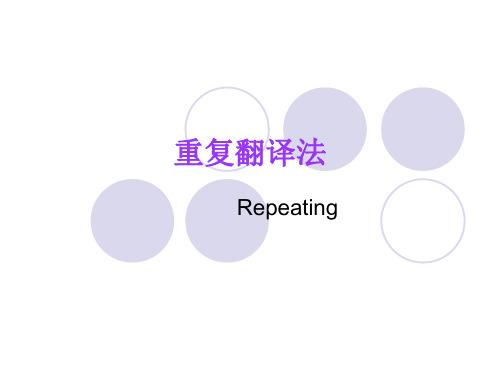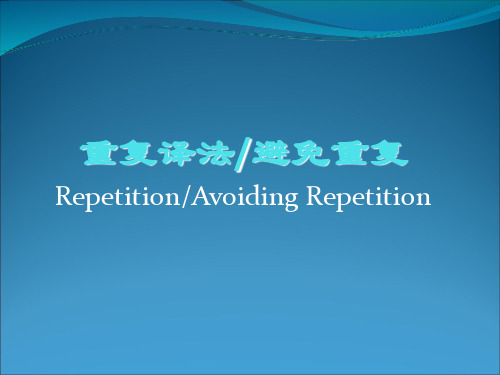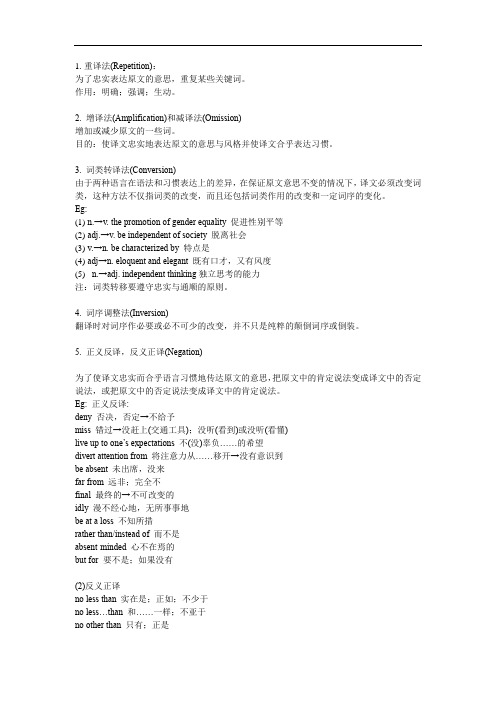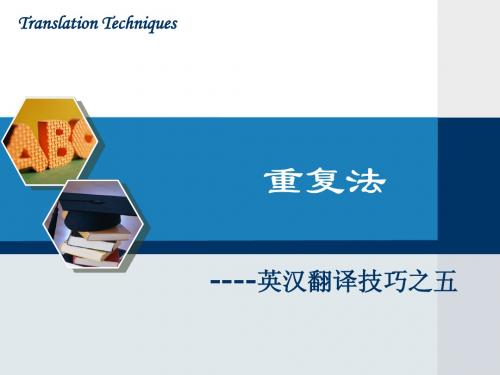英汉翻译技巧——重复译法
重复翻译法

Repetition of Verb
英语中一个动词常跟几个宾语或表语,汉译 时往往重复这个动词。 e.g. Is he a friend or an enemy? — 他是朋友还是敌人呢? e.g. They talked about about his family, about his work and about his future. — 他们谈到他的家庭,(谈到)他的工作, 还谈到他的前程。
Repetition of Noun
n.+substitute 英语第二次提到讲过的事物时习惯用代替词表 示替代,汉语则重复原词。这里的代替词包括 物主代词,不定代词,指示代词,同义词,the same, so, do(as), etc. e.g. Jack kicked the ball to Henry and Henry kicked it back to Jack. — 杰克把球踢给亨利,亨利又(把球)踢回给 杰克。
e.g. My room is lighter than the one next door. — 我的屋子比隔壁的屋子亮。 e.g. If you need any more money, you must get some out of the bank; there is hardly any in the house. — 假如你还需要钱,就得去银行取些出来, 家里没多少钱了。 e.g. The best watches are those made in Switzerland. — 最好的表是瑞士表。 e.g. Happy families also have their own troubles. — 幸福的家庭也有幸福家庭的苦恼。
运用对仗
英语对仗句式前后两部分常有词的重 复,译成汉语时应尽可能保持同样词的重 复。 e.g. Eye for eye, tooth for tooth. — 以眼还眼,以牙还牙。 e.g. Out of sight, out of mind. — 眼不见,心不念。
英汉翻译中的重复翻译法

析:原文中的that指代前文中的approach,在翻译成汉
语时被翻译成了“做法”。原文中的This concept指代
上文中提到的comparative advantage,This concept是
8
comparative advantage的上义词。
Case 6
He demanded total loyalty, not loyalty in the traditional sense, not positive loyalty, but total loyalty, not just to office or party, or concept, but loyalty first and foremost to Johnson.
译文:营销是一种无处不在的社会活动,它远远 超过牙膏、肥皂或者钢铁的销售活动。
析:该句的关系代词that所指代的就是前文中出 现的social activity,在将这类关系代词或者代词 翻译成汉语时,办法之一就是使用汉语里的代词 与之对应。
6
Case 4
Needs are the basic, often instinctive, human forces that motivate a person to do something.
7
Case 5
A more realistic approach toward international
specialization is that of comparative advantage. This
concept says that a nation has a comparative
译文:他要求的是绝对的忠诚,不是传统意义上的忠诚, 也不是一般的忠诚,而是绝对的忠诚,不只是对职务、 政党或观念的忠诚,而是首先对约翰逊的忠诚。
英汉翻译--3翻译技巧-重复与避免重复

牛奶按磅计价。(牛奶是 论磅卖。)
不宜省略
当然,有些场合,冠词是不能省略的。比如不定冠词a 或an 表示数量 “一”时,定冠词the 表示“这”或“那”时,均不能省略。
He left without a word. 他一句话不说就走了。 He said he was getting a dollar a mile. 他说他每开一英里就赚一元钱。
and read it with delight.
我收到了你的信,愉快地读了。
三. 省去泛指的人称代词 英语句子的主语都是泛指的,在译成汉语时,多省掉。
We have 7 days a week and 24 hours a day. 一个星期有7天, 一天有24小时。
We live and learn.
从语法角度进行省略
英汉两种语言在语法上差异较大,例如: 英语经常使用人称代词、关系代词等代词,而汉语代词则
用得较少;
英语重形合、连接词较多,而汉语重意合、连接词较少; 英语有冠词,而汉语没有; 英语介词丰富,而汉语介词较少。 因此,英译汉时可在不损害准确传达原文内容的前提下根
据具体情况将代词、连接词、冠词、介词等略去。
You can always tell the somebody from the nobody at a cocktail party. The somebody come late.
在鸡尾酒会上(人们)常常可以看出大人物 和无名小卒来。那些迟到的就是大人物。
四. 省去作主语的人称代词
英语中通常每句都有主语。人称代词作主语时,重复出现,但 根据汉语习惯,但前句出现一个主语且后句仍为同一主语时, 后句主语一般省掉,符合汉语的表达习惯。如:
翻译技巧之重复法

翻译技巧之重复法重复法是指在译文中适当地重复原文中出现过的词语,以使意思表达得更加清楚;或者进一步加强语气,突出强调某些内容,收到更好的修辞效果。
下面就一起来看看具体的重复法翻译技巧吧!翻译技巧之重复法1一、重复名词1.重复英语中作宾语的名词Students must be cultivated to have the ability to analyze and solve problems.必须培养学生分析问题和解决问题的能力。
They would be very reluctant to postpone or cancel the meeting.他们不太愿意推迟这个会议或者取消这个会议。
2.重复英语中作表语的名词This has been our position—but not theirs.这一直是我们的立场——而不是他们的立场。
John is your friend as much as he is mine.约翰既是你的朋友,又是我的朋友。
3.重复英语介词前所省略的名词英语中常重复使用介词,而将第二个、第三个介词前的名词省略,翻译时则往往可以重复这些省略的名词。
The doctor will get more practice out of me than out of seventeen hundred ordinary patients.医生从我身上得到的实践,地比从一千七百个普通病人身上得到的实践还多。
4.重复定语从句中作先行词的名词英语定语从句常用关系词引导,它一方面代表定语从句所修饰的那个先行词(通常是名词、名词短语或代词),一方面在从句中担任一个成分。
汉语中没有关系词,往往需要重复这个作先行词的名词。
He gave ma a book which I kept to this day.他曾经送给我一本书。
这本书我一直保存至今。
Yesterday afternoon, I met an old friend of mine, who said that he would go abroad the next week.昨天下午,我遇到了一位老朋友。
英译汉翻译技巧

1.重译法(Repetition):为了忠实表达原文的意思,重复某些关键词。
作用:明确;强调;生动。
2. 增译法(Amplification)和减译法(Omission)增加或减少原文的一些词。
目的:使译文忠实地表达原文的意思与风格并使译文合乎表达习惯。
3. 词类转译法(Conversion)由于两种语言在语法和习惯表达上的差异,在保证原文意思不变的情况下,译文必须改变词类,这种方法不仅指词类的改变,而且还包括词类作用的改变和一定词序的变化。
Eg:(1)n.→v. the promotion of gender equality 促进性别平等(2)adj.→v. be independent of society 脱离社会(3)v.→n. be characterized by 特点是(4)adj→n. eloquent and elegant 既有口才,又有风度(5)n.→adj. independent thinking独立思考的能力注:词类转移要遵守忠实与通顺的原则。
4. 词序调整法(Inversion)翻译时对词序作必要或必不可少的改变,并不只是纯粹的颠倒词序或倒装。
5. 正义反译,反义正译(Negation)为了使译文忠实而合乎语言习惯地传达原文的意思,把原文中的肯定说法变成译文中的否定说法,或把原文中的否定说法变成译文中的肯定说法。
Eg: 正义反译:deny 否决,否定→不给予miss 错过→没赶上(交通工具);没听(看到)或没听(看懂)live up to one’s expectations 不(没)辜负……的希望divert attention from 将注意力从……移开→没有意识到be absent 未出席,没来far from 远非;完全不final 最终的→不可改变的idly 漫不经心地,无所事事地be at a loss 不知所措rather than/instead of 而不是absent-minded 心不在焉的but for 要不是;如果没有(2)反义正译no less than 实在是;正如;不少于no less…than 和……一样;不亚于no other than 只有;正是none other than (用以加强语气) 正是,恰恰是,不是别人,正是……nothing but 只有(是);只不过no choice but 别无选择,只(好)得unfold 展开,呈现disappear 消失,失踪carelessly 马马虎虎地,粗心地6. 分译法(Division)分译法主要用于长句的翻译。
英汉翻译重复发转

英汉翻译重复发转汉语有个明显的特点,也是英语所少见的,就是同义词语的重复。
这种重复在汉语修辞上称为反复,为的是突出某个意思,强调某种感情,以加强读者的印象。
但是在许多情况下,并非出自修辞需要,而是语言本身所固有的。
在翻译中,有时为了忠实于原文,不得不重复某些词语,否则就不能忠实地表达原文意思。
这种反复使用某些词语的翻译方法就叫重复法。
一般说来,重复法有三个作用:一是为了明确,二是为了强调,三是为了生动。
1.名词的重复(1)重复作宾语的名词1)We should learn how to analyze and solve problems.我们应学会如何分析问题、解决问题。
2)A good play serves to educate and inspire the people.一出好戏足以教育人民、鼓舞人民。
3)I had experienced oxygen and/or engine trouble.我曾碰到过,不是氧气设备出故障,就是引擎出故障,或两者都出故障。
4)It is o1)Work while you work,play while you play.该工作时就工作,该玩时就玩。
2)It is impossible to live in society and be independent of society.生于社会,不能脱离社会。
3)Dead is the monarch,dead the servant who cringed beforehim,dead the city in which they dwelt.君主死了,在他面前卑躬屈膝、阿谀奉承的侍臣死了,他们居住的这个都城也死了。
ur duty to rebuild and defend our homeland.重建家园和保卫家园是我们的职责。
2)重复作表语的名词1)Every single woman Iever know is apuzzle to me,as,I have no doubt,she is to herself.我所认识的每一个女人对我来说都是一个谜,而且我毫不怀疑,她自己对她本人也是一个谜。
11.重复法

重复译法主要体现在以下几个方面: 1、英语中常重复使用前置词,而将第二个、第三个前置词 的名词省略,翻译时则往往要把名词重复; 2、英语句子常常用一个动词连接几个宾语或表语,在译文 中要重复这个动词; 3、英语句子中动词后有前置词时,在第二次第三次往往只 用前置词而省略动词,在译文中则要重复动词以代替英语 中重复的前置词; 4、英语中两个并列句中后句的动词承接前文省略,而在汉 语中独立的分句必须具备谓语,翻译时必须重复译出英语 中省略的动词。 5、英语中用代词的地方,翻译时往往可按照汉语习惯重复 其所代替的名词。
三、重复形容词 1). We want such materials as can bear high temperature and pressure. 我们需要能耐高温、高压的材料。 2). Everybody appreciates polite words and manners. 每个人都会赞赏礼貌的言辞和礼貌的举止。 3). They are loyal to the motherland and the people. 他们忠于祖国,忠于人民。
Translation Techniques
重复法
----英汉翻译技巧之五
Repetition (重复法)
Strictly speaking, repetition is under amplification, namely supplying some necessary words in target language. But this amplification is different from what we discussed in Chapter IV. Here we mean to repeat the same words or phrases which are given previously in the version. Repetition is employed for the sake of clearness, for the sake of emphasis, and for the sake of vividness.
翻译----重译法

古典文学和散文中汉译英的重复
• 寻寻觅觅,冷冷清清,凄凄惨惨戚戚。 • Seek, seek; search, search; Cold, cold; bare, bare; Grief, grief; cruel, cruel grief. “沉默啊!沉默啊!不在沉默中爆发就在沉默中灭 亡。”(鲁迅《呐喊》自序) ‘‘Silence! Silence! Unless we burst out, we shall perish in this silence.”
(二)运用词的重叠 :词的重叠是汉语常用的一种 修辞手段。
• 如:寻觅:寻寻觅觅;冷清:冷冷清清; 清楚:清清楚楚 • I had been completely honest in my replies, with holding nothing. • 我的回答是坦坦荡荡,毫无忌讳。 • His children, too, were as ragged and wild as if they belonged to nobody. • 他的那些孩子,也是穿的破破烂烂,粗野 不堪,就像没有父母似的。
23
汉译英时的重复
• 一,汉语重复,英译时也重复。 • 二,根据两种语言各自的习惯用法, 以不同的表达方式进行重复,这种重 复通常是为语并非一概排斥重复,英语中的重复多 数是用在修辞上起到强调的作用(余立三, 1985),但是重复在英语中的使用远没有 汉语中普遍。有人将“叠言”(rhetorical repetition)列为美学修辞的一种。尽管累 赘重复(redundancy)是修辞的一忌,但在 特定情景中有意识的重复却能起到很有力 的修辞效果(范家材,1992)。 • 特点: • 为了更加忠实于原文,体现翻译时“信” 的原则 25 • 一般出现在中国古典文学的散文的翻译
- 1、下载文档前请自行甄别文档内容的完整性,平台不提供额外的编辑、内容补充、找答案等附加服务。
- 2、"仅部分预览"的文档,不可在线预览部分如存在完整性等问题,可反馈申请退款(可完整预览的文档不适用该条件!)。
- 3、如文档侵犯您的权益,请联系客服反馈,我们会尽快为您处理(人工客服工作时间:9:00-18:30)。
英汉翻译技巧——重复译法
使用重复法的目的主要有三个:
一是使意义明确,
二是使译文生动活泼,
三是加强语势。
一、使意义明确
1.重复名词
1) We should learn how to analyze and solve problems.
2) It is our duty to rebuild and defend our homeland.
3)A good play serves to educate and inspire the people.
4)It was he who first repudiated and breached the understanding.
5)All of these arrangements were a prelude to the ball, the hostess' ultimate prize.
6)They slipped out into the open,avoiding the kitchen, a spacious separate building.
2.重复动词
1)People forget your face first, then your name.
2)Then he spoke of the rise of charity and popular education, and in particular of the spread of wealth and work.
3)They talked of things they longed for ─ of meat and of hot soup and of the richness of butter.
4)He encouraged this bumptious young ma n to write of his own region──of its bleak poverty and of its women old before their time.
3.重复代词
1)The country has its romantic feeling.
2)However you travel, it’ll take you at least two days.
3)Whoever works hard will be respected.
4)Choose whatever you like.
5)Ignoring a problem does not solve it.
6)When her eyes looked up, they were very large, odd, and attractive.
二、使译文生动活泼
1)grotesque
2)careless
3)in chaos
4)street gossip
5)rumors
6) Talking and laughing, running and jumping, the children had a good time at sea-side.
7) But at that time, she was the only woman there.
8) His folks ate up everything he had.
三、加强语势
1) Would you please please please please please please please stop talking.
2)Any my poor fool is hanged. No, no, no life.。
